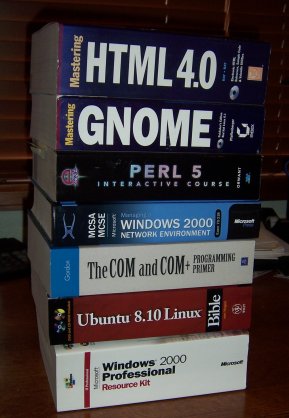 Space is getting tight in here again, and books are getting tossed on top of other books. It’s long past time to thin the ranks a little–both on the shelves and in the closet–and in standing in front of the computer section here it occurred to me that if I were attempting to free up shelf-inches I should probably go after the biggest spines first.
Space is getting tight in here again, and books are getting tossed on top of other books. It’s long past time to thin the ranks a little–both on the shelves and in the closet–and in standing in front of the computer section here it occurred to me that if I were attempting to free up shelf-inches I should probably go after the biggest spines first.
And so I did. After no more than five minutes, I freed up sixteen inches of shelf space–in seven books. None of these are essential. I have other, much newer books on HTML and GNOME, and given that I haven’t written a line of Perl in five years or more, one Perl book (out of two) is plenty. There is no longer a single instance of Windows 2000 here beyond a VM, so monster Win2K tomes are doing nothing but crowding out other, more useful things from my shelves.
Speaking of which: The top two titles date back to the mid-1990s, and illustrate the “spine wars” raging at the time among computer book publishers. If your books were all three inches thick, there would be fewer shelf-inches in the bookstores for your competitors, so we all wanted to make ours three inches thick. (Sybex was a champ at that, as you can see.) Coriolis published a few thick books, the thickest of which was Michael Abrash’s Graphics Programming Black Book, but compared to the other presses we were pikers. Huge spines tended to crack and spill pages in regular use, as we discovered after Michael’s book was out there for awhile. Page count was not always in proportion to spine width, either. Mastering HTML 4.0 was barely 1,000 pages long. The Coriolis HTML Black Book by Steve Holzner (2000) was 1,200 pages long, and only 1 5/8″ thick. That’s 200 more pages in one fewer inch. The difference was thicker, pulpier paper.
The Microsoft Press book at the bottom is a sort of circus freak and may never be equalled in the spine wars: It’s 1,800 pages long and a full 3″ thick. It’s not a bad book, but I’ve wondered here before it it was mostly a stunt.
Anyway. I’ve already culled an additional six or seven books, but I doubt I will ever have a stack equalling the one shown above. Ahh, computer book publishing in the spine-swellin’ 90s–what a ride that was!












Hello,
I am going through the same exercise at this time. I have quite a few books I want to remove from my shelves. I hate throwing out a ‘good’ book.
What do you do with your books when they are no longer needed or wanted?
ED
It depends entirely on the book. Computer books don’t age well, especially version-dependent books. The ones shown here will probably go into the recycle bin next week. Most used bookstores don’t want old computer books, and apart from some (minimal) historical interest, these are about as useless as they come. None are rare, and I’m guessing anybody could get most of them for a buck plus shipping on ABE Books. If I had nothing but spare time I might just possibly try to sell them online, but I have a novel to finish and much else to do here in the office. So they’ll be pulped, like most of their brethren were in that same era.
I donate mine to the library, if they don’t want them they sell them in their book drive and if they don’t sell I imagine that recycle them. I just can’t bring myself to throw out books, even old ones.
BTW, that perl book is still current — I still haven’t seen Perl 6 yet 😉
I have another current Perl book, and certainly don’t need two of them–especially if they’re both that thick. What I don’t do in some flavor of Pascal these days I do in Python.
I may ask the local charities if they want computer books the next time they call with the “A truck will be in your area on…” message.
I’ve used Bookmooch.com for the past 5 years or so to offer up my old computer books. Problem is, I usually use my points to mooch other old computer books.
My best mooch: “Unix Programming Environment”, signed by Brian Kernighan.
Another option for getting rid of older computer books is to put them out at a garage sale (hopefully one with a high amount of traffic, like a church or a citywide sale). I’ve gotten rid of a few volumes this way. (Yet somehow, I won’t let go of my copy of “Beneath Apple DOS”…maybe for nostalgia/sentimental reasons, I don’t know.)
In terms of length…I seem to remember that “Tricks of the 3D Game Programming Gurus” by Lamothe clocked in at around 1,700+ pages, too.